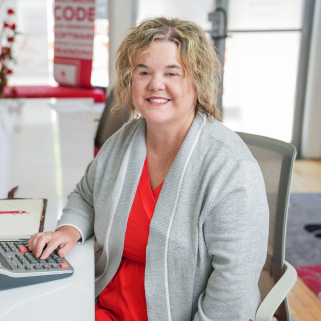Teaching employees to think and act like owners is a concept pioneered by Jack Stack in his turn-around of SRC Holdings in the 80s that inspired both a book and an open-book business methodology that is now known as The Great Game of Business (GGOB).
Heather Carbray, Red Caffeine’s Director of Finance and Administration was a featured speaker on Financial Transparency in a Service Company at the 2019 Gathering of the Games Conference in Dallas, TX. In this article, she discusses how maintaining an openness to new ideas and a willingness to experiment led to improved engagement, efficiency, and profitability.

Time is Money: Playing The Game in a Service-Based Company
Originally published at GreatGame.com on October 11, 2019.
I have often heard that The Great Game of Business seems like it is geared toward manufacturing companies or organizations that are more product-based. That was my initial impression when I first read the book. While the practice of open-book management seems versatile, some of the rules may seem like they do not apply to a service-based company. But once you open the books and start playing The Game, it is easy to adapt.
Think Outside the Book
In a service-based company, we had to think a little outside of the pages of the book. Common areas we have seen other service-based organizations adjust include information they share on their scoreboard, how they project their revenue, and how they keep employees engaged and accountable at Huddles.
At Red Caffeine, for example, we have included accountability scorecards in our Huddles. Since we bill solely based on hours of work completed, we found it important that each employee was able to commit to the number of billable hours they will work in a week, based on their contracted work for the month, and be held accountable for hitting their numbers. At each Huddle, individuals announce their committed hours for the week, which gets recorded on a team scorecard. We also look at the previous week to see if everyone hit their commit, or discuss the story behind the number of a missed commit. Doing so has not only improved engagement and efficiency but has also helped us come closer to our revenue forecast.
If At First, You Don’t Succeed…
Playing The Game in a service-based company has been about trial and error for us. We went through several iterations of scoreboards and forecasting processes before we got it right. This is a great place to “harness the wisdom of the crowd.” Find out what is important to them, or how information can be presented to make it easiest to understand.
While the book suggests reporting on cash flow, accounts receivable aging, etc., we found these things were not critical for our team to understand. We began to lose engagement at this point in the Huddle, so we removed them. While this may not be the right move for your company, there may be other things that make more sense to add or remove from your Huddle. I do suggest trying something for around six months before making changes, as it takes some time to get into the groove of things. Just remember that not everything is set in stone.
Let Them Lead
Something we learned early on was how differently people paid attention to our expenses once they owned the lines. For example, our finance team would send our tech department a list of software we were being billed for each month. Each month they would respond back that all of those tools were still relevant. Once that line became their responsibility, we began saving hundreds of dollars in software that we had not been using. Giving your team the opportunity to truly own a piece of the bottom line is a powerful thing.
It is also important to allow your team to lead the Huddles and discussions. Having your finance person or leadership team run the Huddles and provide all of the answers will not keep your team engaged. I can confidently say that there are members of your team that will have great ideas, answers, and solutions if they are given the floor to do so. Opening the books is only part of it. GGOB is a team sport—so, involve all of your players.
GGOB sets the foundation for any organization to play. You just have to make it your own. Figure out what works best for your company. Involve your team to set your game plan and take your company to the next level.
Let Them Lead
Something we learned early on was how differently people paid attention to our expenses once they owned the lines. For example, our finance team would send our tech department a list of software we were being billed for each month. Each month they would respond back that all of those tools were still relevant. Once that line became their responsibility, we began saving hundreds of dollars in software that we had not been using. Giving your team the opportunity to truly own a piece of the bottom line is a powerful thing.
It is also important to allow your team to lead the Huddles and discussions. Having your finance person or leadership team run the Huddles and provide all of the answers will not keep your team engaged. I can confidently say that there are members of your team that will have great ideas, answers, and solutions if they are given the floor to do so. Opening the books is only part of it. GGOB is a team sport—so, involve all of your players.
GGOB sets the foundation for any organization to play. You just have to make it your own. Figure out what works best for your company. Involve your team to set your game plan and take your company to the next level.
If You Enjoyed This Article, Check Out These….
Join Thousands Of
Like-Minded Folks
Receive monthly business growth tips
and event invites right to your inbox.




